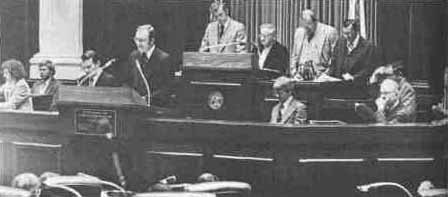Legislative Action By GARY ADKINS
A TAX BREAK for Illinois industry may be forthcoming this spring, though the form and sponsorship of that break will comprise a big political issue in the legislature. At least four different tax cut proposals have been advanced thus far, including one by Gov. James R. Thompson that would give $40 million worth of tax exemptions to industry expanding or locating in Illinois. Thompson's proposal, which he says would be phased in over a two-year period, would lift the sales tax on manufacturing equipment at new or expanded industrial sites in the state. A similar proposal has already been advanced by state Sen. Robert J. Egan (D., Chicago). Egan's bill, S.B. 736, is somewhat more sweeping than the governor's; it includes the cost of repair or replacement parts in the tax exemption that would be offered to manufacturing firms. Egan's bill was given a "do pass" recommendation in the Senate Revenue Committee last year, but it never came up for a vote on third reading (passage stage) on the Senate floor. Democrat Egan was rather miffed at Republican Thompson's proposal. "The Governor's not going to get his bill out of my committee [Egan is chairman of the Senate Revenue Committee]. If he's going to get a tax bill through this session of the General Assembly, it's going to be an amendment to my bill," Egan was quoted as saying. Egan was also critical of the substance of the Thompson proposal, saying it would not help small businesses in the state modernize their plants since the sales tax would still apply to purchase of replacement parts.
The Illinois State Chamber of Commerce backs Sen. Egan's plan. They say it would cost about $43 million in fiscal year 1979, and they also point out that Illinois is the only Midwestern state that still has a sales tax on manufacturing equipment. The state chamber has one of the most powerful and persuasive lobbying mechanisms in state government. They also put out pro-business newsletters, rate legislators and legislation according to impact on business, and give money to campaigns of those candidates they consider pro-business. The state chamber and other manufacturing and business interests claim that lifting the sales tax on manufacturing would at least partially counteract the migration of manufacturing concerns from Illinois to Sun Belt states. House minority leader George H. Ryan (R., Kankakee) decried such defection when he offered a seven-point program last February aimed at spawning economic growth. Ryan said Illinois "has suffered disastrous losses in the area of manufacturing jobs in the last decade . . . The fact that we have lost over 200,000 manufacturing jobs since 1967 in Illinois is absolutely staggering. Those losses are reflected in our unemployment rate which is entirely too high," Ryan said at a Statehouse press conference. Ryan's program, called the "Ryan job stimulus package," will be offered in seven bills. Its major components include: investment and tax incentives, reduction of business costs through governmental training programs, reduction of unemployment insurance costs and increased state support for the promotion of industrial growth. Ryan's most significant bill would grant insurance firms headquartered in Illinois a corporate income tax credit or all assets invested in industrial expansion within the state. "It is estimated that Illinois insurance companies collect yearly premiums of nearly $13.5 billion much of which is available for immediate reinvestment," Ryan claims. Of nearly equal importance in Ryan's plan is a bill to permit county boards to waive property tax for any new industry locating within the county. The tax exemption would be good for up to ten years on an amount not to exceed $1 million and could not be granted to any firm moving from within one part of the state to another. Ryan's proposals also would provide an employer wishing to expand operations or begin a new business in the state free job training for skilled positions. Community colleges and vocational schools would be mandated to provide such training with funds from the Department of Business and Economic Development (BED). But the training , would only be available to employers who agreed to hire at least 60 percent of new trainees from the ranks of the unemployed or recipients of welfare. Ryan would give more money to BED to aid in industrial growth by employing more staff members to promote the state to potential employers and help existing ones. He would set up a fourth foreign trade office to be located in the Middle East. 28/April 1978/Illinois Issues Another bill would allow the Bureau of Employment Security to use penalty monies , collected from employers behind on their taxes, to hire 20 to 30 new investigators of unemployment insurance fraud. Likewise, he would tighten establishment compensation laws to: give longer disqualification periods to people fired for misconduct or those who leave work voluntarily, require higher base period earnings before part-time employees or substitute teachers may qualify for benefits, set stronger penalties for fraud conviction and allow employers more time to challenge the eligibility of former employees. Ryan says the total cost of this extensive government program would be $1.8 million. A fourth economic game plan, aside from those of Gov. Thompson, Sen. Egan and Rep. Ryan, was advanced by Cook County Board President George Dunne, a powerful Democrat. Dunne would like to give businesses a tax break if they build new plants in depressed areas. His plan would lower property tax evaluation for 13 years for businesses which locate in areas of high unemployment. The reduction would be from be from the present valuation of 40 per cent of market value down to 16 percent. Areas eligible for such tax breaks would be selected under criteria set for areas of "substantial unemployment" by the 1973 federal Comprehensive Employment and Training Act (CETA). April 1978/Illinois Issues/29
|
||||||||||||||||

